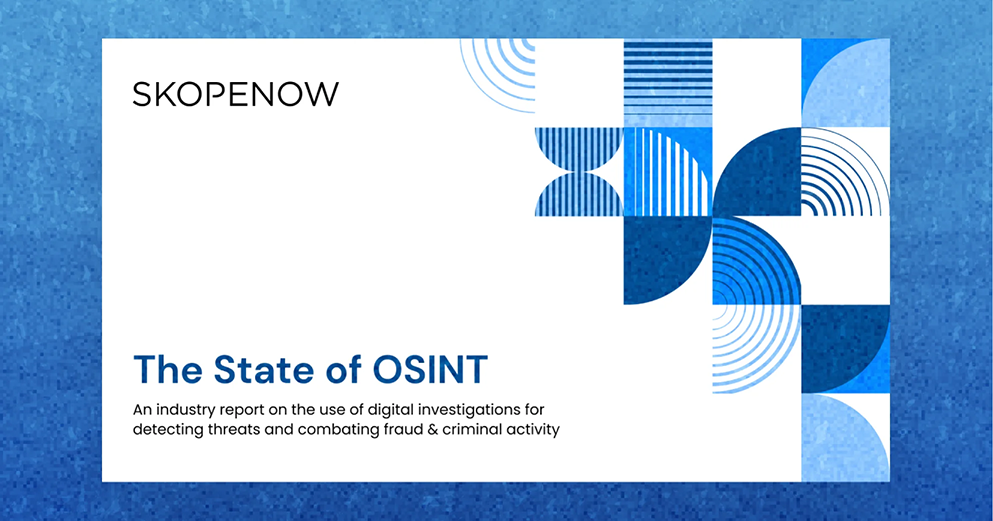October 20, 2023
OSINT Live 2023 Recap: Top Takeaways

Steve Adams
Product Marketing Manager
The curtains have officially closed on the second annual OSINT Live, and it was a huge success. Our speakers' expertise and insights didn't just add to the event; they defined it. After everything wrapped, our team took a step back, compared notes, and started compiling the most important takeaways and moments from the exhaustive day of programming. So if you missed out or want a quick refresher—we have you covered.
Open-Source Investigations Come of Age
Presenter: Eliot Higgins, Founder of Bellingcat
Open-source intelligence (OSINT) offers unparalleled views into global events and conflicts directly from those affected. This new angle has reshaped conflict reporting, giving key stakeholders a richer understanding of warfare narratives. In his talk, Eliot underscored this using the Ukraine conflict as an example.
Key Takeaways:
- Disinformation is rampant, but metadata within videos and photos can help in debunking fake content. Eliot pointed out the importance of robust fact-checking and verification processes to ensure the accuracy and reliability of information being reported.
- There's immense value in archiving and geolocating videos and photos from conflict zones—not just for real-time awareness, but for future justice and accountability. The need for digital archiving has emerged as more and more evidence of conflicts and human rights abuses are captured on personal devices.
- There has been a noticeable shift in the speed and effectiveness of debunking disinformation due to the collaborative efforts of the online community. This collective effort has resulted in rapid debunking of fake content, sometimes within hours. Platforms like Bellingcat's Atlas and the Global Authentication Project serve as tools for the community to collaborate on geolocating and verifying content.
- Satellite imagery services like Planet Labs, Umbra, and Maxar have revolutionized conflict monitoring. Such advancements allow investigators to obtain high-resolution images rapidly after an incident, drastically reducing the time taken to gather evidence.
Surveillance Art, Dying Phones, and Fake Likes
Presenter: Dries Depoorter, Artist
Dries Depoorter showcased his innovative works, many utilizing open camera data, highlighting pieces such as "The Flemish Scrollers" and "Die With Me." Through his art, he merges technology and artistic expression, urging reflection on the implications of the digital age and our place in it.
Key Takeaways:
- Depoorter's work consistently underscores the fragility of privacy in the digital age, revealing how easily personal information and activities can be accessed and shared.
- Though many of his projects start online, they often have physical elements or manifestations, like installations or vending machines, bridging the digital and physical art worlds.
- Depoorter’s art pieces heavily leverage technology, ranging from APIs, Raspberry Pi clusters, and advanced facial recognition techniques.
- Dries finds open cameras via websites like Shodan and Insecam.
Supercharging People Investigations with the Right OSINT Strategy
Presenter: Ritu Gill, Founder of OSINT Techniques
Staying updated in the ever-evolving OSINT field is crucial for researchers, regardless of their expertise. During her session, Ritu introduced advanced tools and techniques, equipping participants with a more refined skill set for online intelligence research.
Key Takeaways:
- Pivoting is essential. One piece of data can lead to more information. For instance, using a phone number to find related email addresses or social profiles. When primary targets are elusive on platforms like Facebook or Instagram, secondary targets such as family or friends can be useful.
- Many individuals unintentionally reveal a lot about themselves, including connections with family and friends. People often include personal details like birth year or location in their usernames. Platforms like WhatsMyName.app can help enumerate these usernames across multiple websites.
- Different search engines index the web differently. Using multiple engines can yield varied results. Country-specific search engines and social media platforms are crucial for international searches. Tools like App Addy can help identify popular platforms in different countries. Be aware of the privacy laws of the country when collecting information.
- When using search engines, use file types, site search, and special characters (like quotes) to refine and get more precise results. Always add relevant keywords to narrow the focus of your search.
Pivoting OSINT: Demonstrating the Value of Expert Research
Presenter: Cynthia Hetherington, Founder of the OSMOSIS Institute
In her presentation, Cynthia emphasized the pivotal role of OSINT analysts in a tech-centric world, focusing on their solution-driven value. The main message was to not just adapt to technology but to leverage it for tangible results and advancement.
Key Takeaways:
- Understanding the stages of the customer journey, including awareness, consideration, purchase, retention, and advocacy, is crucial in selling the idea of OSINT and its applications both internally and to clients. Often, security is seen as an expense rather than a necessity. The challenge is demonstrating its value as well as the potential costs and repercussions if ignored.
- There's a need to balance between free resources and paid tools, ensuring that OSINT professionals have the best instruments at their disposal. Advocating for these tools often requires making a business case to stakeholders.
- With the increasing reliance on online orders and the subsequent pressure on supply chains, the role of OSINT becomes crucial in understanding and managing these complexities.
- When dealing with corporate executives or any other stakeholders, it's essential to communicate in a jargon-free manner and focus on the desired outcome rather than the methods. It's important to be transparent with clients about what can and cannot be done, especially when it comes to legal boundaries.
Why Accuracy and Knowledge Still Beat AI
Presenter: Skip Schiphorst, OSINT Instructor at i-Intelligence
In OSINT, the challenge extends beyond data collection to understanding multilingual content. Skip highlighted the importance of mastering foreign language investigation to stand out and provided strategies to enhance multilingual research skills.
Key Takeaways:
- While AI can process vast amounts of data quickly, it can overlook details, misinterpret context, or provide inaccurate translations. Humans possess the ability to connect dots, contextualize information, and validate data with a deeper understanding. The ideal OSINT professional can strike a balance between the efficiency of AI and the detail-oriented nature of traditional investigative techniques.
- An effective OSINT team has a mix of individuals with different expertise and approaches to information gathering. Creating shared keyword databases and ensuring their accuracy can save time and increase efficiency.
- For accurate intelligence on foreign places, it's critical to research in the region's native language alongside English. Successful foreign language research hinges on accurate language identification, appropriate keyword usage, advanced search operators, and effective source discovery.
- While tools like Google Translate and DeepL are beneficial, relying solely on them can result in misinterpretations. Multiple tools should be cross-checked for best results.
OSINT Live took place on October 5th, 9:00 AM - 2:30 PM ET. If there were any sessions you missed or would like to revisit, on-demand recordings are available here.
At Skopenow, we understand the importance of staying up-to-date on the latest developments, trends, and techniques in OSINT. Our solutions empower organizations to more effectively and efficiently gather and analyze open-source information, identify trends and patterns in the data, and detect emerging threats and risks. Start unlocking the power of open-source intelligence with a free trial today: www.skopenow.com/try.


